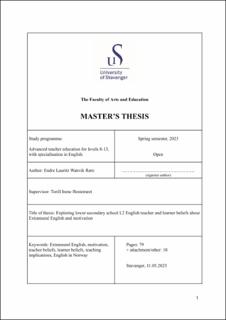| dc.description.abstract | This thesis aimed to explore lower secondary school L2 English teacher and learner beliefs around extramural English (EE) and motivation. Through interviews with three 10th grade English teachers from different schools, the goal was to discover what they believed were benefits and challenges of modern students’ EE habits, as well as the teaching implications of this development. Through a questionnaire performed by the teachers’ three English classes, 10th grade English students’ beliefs were reported, and considered both in regards to what their beliefs around EE are, as well as their beliefs around motivation. Furthermore, the thesis aimed to discover their beliefs around how English should be taught in these EE times.
The findings of the project showed an agreement between both teachers and students in regards to the positive effects of EE in general, and its role in students’ English language development. The teachers reported a drastic change in modern students’ language capabilities, and most of the students believed EE to be the main contributor to their current English proficiency. The average student in this project reported spending 4 hours and 20 minutes daily on their various EE activities, and activities like watching TV, listening to music, using social media and playing video games were the most popular activities reported. The teachers did, however, express reluctance towards implementing certain EE activities into the classroom, due to the difficulty of planning such a project while remaining true to the curriculum and competence goals. They further believed EE activities could be implemented as a tool to engage and motivate students in class, but there was expressed reluctance in this regard as well, due to their limited time frame, and because many EE activities, they believe, will fail to engage an entire classroom. They did, however, mention other ways of utilising the students’ EE habits in the classroom, through allowing the students to work on topics that reflect their interests, such as writing about influencers or video game creators.
The teachers believed the students’ EE habits to present benefits such as a vast increase in English proficiency, an increase in motivation through a greater sense of mastery, as well as further possibilities for teachers to connect with the students personally, in order to build relationships and improve the classroom situation in general. In regards to challenges, they believed the implementation of EE activities to be a great challenge, and they mentioned how modern students’ proficiency has gone so far up from before, that even students who perform well in the course, feel inferior due to other, more proficient, peers in the classroom. This served as a demotivating factor for several students, and caused many of them to feel like the English course was hard.
The students believed EE activities should be included in the English course, mainly because it would mean more variation in the classroom. Almost half of the students also expressed their belief that with the way English is currently being taught, there are irrelevant or seemingly useless topics within, that serve as demotivating factors. The students expressed desiring more oral activities in the classroom, and several students reported wanting more social activities as well. Within the students of this research study, several differences were discovered between those who spend an above average amount of time on EE activities, versus those who spend below average. The EE active group was discovered to be far more motivated within the classroom, felt far more competent, and they were far more satisfied with their current English proficiency, than the non EE active group. | |
